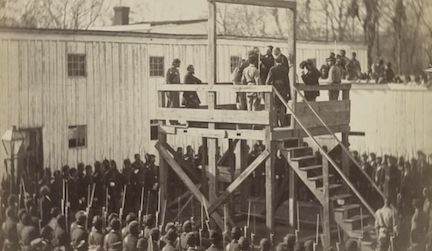The Deadline for the Soul
The word “deadline” has an interesting, and oft, well, “deadly” history.
Earliest occurrences of the word seemed to have referenced a fishing angler’s weighted line which would hang perfectly still, or “dead” in the water, bait attached, to attract unsuspecting fish who, upon biting such line, would soon find themselves also “dead.”
Its meaning was later expanded to refer to any fixed or immovable line.
But it was the ravages of war which would give the word its next iteration. Enter one infamous Confederate Civil War prison commander, Henry Wirz, responsible for the operations at the notorious Confederate prison at Andersonville, Georgia.
In 1864, Wirz was put in control of Camp Sumter, a newly-established internment camp for Union soldiers located near Andersonville in rural Georgia. Over the remaining 14 months of the war, Camp Sumter grew to become one of the largest prisoner of war camps in the entire Confederacy. At its peak, it held more than 30,000 Union prisoners, all of whom shared an enormous 16.5-acre open-air paddock—conditions inside of which were notoriously grim. Disease and malnutrition were rife, and a lack of clean water, warm clothing, and adequate sanitation led to the deaths of many of the camp’s prisoners. Of the 45,000 Union prisoners held in the Camp at one time or another, it is estimated that almost a third succumbed to Sumter’s squalid and inhumane conditions.
But wait, there’s more. One of most damning examples of his inhumanity was his implementation of what became known as the Camp’s deadline:
“ … a line around the inner face of the stockade or wall enclosing said prison, and about twenty feet distant and within said stockade; and so established said dead line, which was in many places an imaginary line, in many other places marked by insecure and shifting strips of [boards nailed] upon the tops of small and insecure stakes or posts, he … instructed the prison guard stationed around the top of said stockade to fire upon and kill any of the prisoners aforesaid who might touch, fall upon, pass over or under or across the said “dead line ... “ — Report of the Secretary of War, October 1865
Wirz must have been deemed to have of “crossed the line” of human decency, because he was found guilty of war crimes, and was hanged on the November 10, 1865.

*Execution of Captain Henry Wirz in 1865 / Library of Congress
By the early 20th century, with its wartime inhumanity connotations nothing more than a speck in American culture’s rear view mirror, a new meaning emerged from the pages rapidly churning off journalistic printing presses.
Printers used the word to describe that point at the bottom of a type case (printing tray), below which typeset could not be added. It was the "deadline" on the tray. Journalists, rushing to get their stories to press, competed to get space on the page before the “deadline” was "set" and there was no more room to include another story.

While the typesetting machines of the early 20th century are likewise but a speck in our rear view windows, the connotation of the term has since stuck and expanded. Today, the word deadline is used broadly to refer to any date or time by which something must be accomplished.
It may no longer exclusively refer to matters of life and death, but urgency is still at the core of its meaning.
In spiritual terms, there is a deadline looming over each one of us which does indeed bear life and death consequences. In fact, this deadline is itself a choice between life (eternal!) and death. Only in this case, we do not know when or how the deadline will present itself.
God has told us in His Word that it is “appointed for man to die once, and after that comes judgment” (Hebrews 9:27, ESV). He has likewise told us that we must choose “this day” whom we will serve (Joshua 24:15); “… behold, now is the accepted time; behold, now is the day of salvation (2 Corinthians 6:2, NKJV).
None can possibly know when that deadline will come. As such, don’t delay another moment. “[As] Christ’s ambassadors, as though God were making his appeal through us. We implore you on Christ’s behalf: Be reconciled to God! (2 Corinthians 5:20, NIV), TODAY!
No Consolation In Someone Else's Demise
When I was in kindergarten, corporal punishment was still practiced in the schools. My experience with it is one of my earliest memories of my school years.
One of my classmates, we'll call him little Johnny, had been acting up. So the teacher took him by the ear and led him to a large closet that connected our class to an adjoining classroom.
The purpose of this arrangement was to allow one teacher to assist another with discipline. As little Johnny was led into the closet and the door was closed, we could hear our teacher lecturing him about his behavior. Then we heard the rapid paddle blows, presumably to his little bottom, which was followed by a loud outburst of tears.
When the teacher emerged with little Johnny in tow, something about the visuals struck me as humorous, so I let out a loud laugh. That was the first big mistake of my academic career! The next thing I knew, I was the one being dragged by the ear into that same closet where I received a similar lecture, only to emerge with the same sore bottom and my eyes full of tears — except this time no one laughed!
Like a game of backgammon where the board is turned to reverse the fortune of the players, I could not have been more surprised to have the tables turned on me that day. Nevertheless, I limped away from the experience having learned a valuable lesson:
There is no consolation to be taken in someone else’s demise, only a warning that judgment comes to us all.

Scripture speaks clearly to this point.
When news of a grievous atrocity reached his entourage, Jesus used it as an important opportunity to teach a similar lesson. In Luke 13:1-4 we read,
About this time Jesus was informed that Pilate had murdered some people from Galilee as they were offering sacrifices at the Temple. "Do you think those Galileans were worse sinners than all the other people from Galilee?" Jesus asked. "Is that why they suffered? Not at all! ... And what about the eighteen people who died when the tower in Siloam fell on them? Were they the worst sinners in Jerusalem?” (NTL).
If God governed the world by the principle of justice, then certainly these events would provide an accurate barometer of divine intent. In the minds of Jesus’ disciples, the message behind these dramatic events seemed obvious. Given their stern religious instincts, the disciples would have naturally interpreted these events as God’s judgment on those who died. “Image how enraged God must be,” they would have thought to themselves, “to have these people killed in the very act of offering their sacrifices at the Temple! What terrible things must they have done?”
But Jesus would offer a very different take on these tragic events. Rather than see them as signs of God’s displeasure, he interpreted them to be the kinds of things that could have happened to anyone. Notice, after raising the question of whether they the worst sinners in Jerusalem, Jesus concluded with a resounding, “I tell you, no!” (Luke 13:5, NLT).
The implication was that the Galileans who were murdered by Pilate, as well as those who died when the tower of Siloam fell on them, were simply subject to the arbitrary nature of life, just like the rest of us. They weren’t the worst sinners in Galilee or Jerusalem, they just happened to be in the wrong place at the wrong time!
That old saying, “we’re all in the same boat” comes to mind. Of course, this is consistent with a world governed by the principle of grace. In a random world, anything that happens to one could just as easily have happened to the rest.
But just because something is indiscriminate, it doesn’t mean that there is no intended message behind it. Whether it’s a blessing, like the rain, or a tragedy, like a falling tower, Jesus attributed divine meaning to it, but never the significance his audience expected.
"But unless you repent,” Jesus would explain, “you too will all perish” (Luke 13:5, NIV). With these words, Jesus inferred that incidents such as these send a message, not that judgment has come to those directly affected by trial or tragedy, but that judgment is coming to all.
Like tremors that forewarn of impending doom, the catastrophes of life offer an ominmous forewarning of God’s impending judgment on all who fail to repent.
When we pass judgment on the victims of a catastophe, it lulls us into a false sense of security. We think the danger has passed and that the message was delivered to those who deserved to be punished. But Jesus made it clear that when a random event strikes down a few, its message is actually meant for those who aren’t even directly affected by it.
Tragedy is like a warning shot, fired for the benefit of all who are within earshot. The message isn’t meant for those who perish. If a tower falls on someone, it’s a little late for them to learn a lesson from the experience. If there is a message behind the tragic events of life, it has to be for those who are left behind. Ironically, most people tend to think that these experiences bear no relevance to the rest of us, when the only real relevance is to the rest of us!
So, whether it’s God’s correction of Job’s friends (Job 42:7), or Jesus’ correction of his disciples in this passage, the Bible offers numerous examples of how ill advised it is to assume that we know why someone else has suffered. That’s not possible to know in a world governed by the principle of grace, where the trials and afflictions of life say nothing about what we deserve or what God thinks about us.
In such a world, being spared is not a consolation, it’s a warning! But it’s even more humbling than that, because we are being forewarned at the high cost of someone else's peril!
Thus, rather than judging those who have suffered, it behooves us to be humble and receive the message their tragedy was meant to convey to us. Just as I learned in kindergarten, there is no consolation to be taken in someone else’s demise, only a warning that judgment comes to us all.
Playing Dumb
The Verge Reports:
TV networks have figured out how to game the Nielsen ratings system. It’s as easy as playing dumb, literally. On days when programmers know their viewership will drop, like on holiday weekends or during sporting events, they “accidentally” misspell their show’s name on the nightly Nielsen lineup, according to The Wall Street Journal.
Over the Friday of Memorial Day weekend, for example, NBC aired NBC Nitely News instead of its usual NBC Nightly News so the holiday drop in viewership didn’t affect its ratings standing. Nielsen’s automated system counted that misspelled show as an entirely different program. By doing this, NBC managed to actually gain ratings against its main competitor: ABC World News Tonight.
NBC apparently misspelled its shows 14 times since the start of the 2016 to 2017 TV season, and it’s not the only network to pull this tactic. This season, ABC did so seven times with its Wrld New Tonite, while CBS replaced The CBS Evening News with CBS Evening Nws 12 times.
![]()
Playing dumb is one way to get around the rules—a pretty effective one if you’re attempting to get around the Nielsen ratings system. But it’s not so effective if you’re attempting to get around God’s rating system!
“For there is nothing hidden that will not be disclosed, and nothing concealed that will not be known or brought out into the open” (Luke 8:17).
God knows us. He knows our name. Misspelling it won’t help!